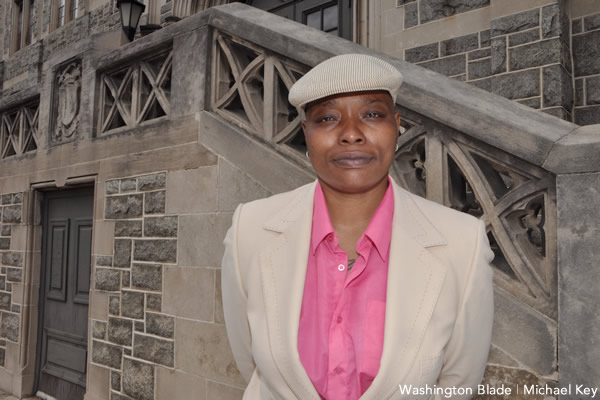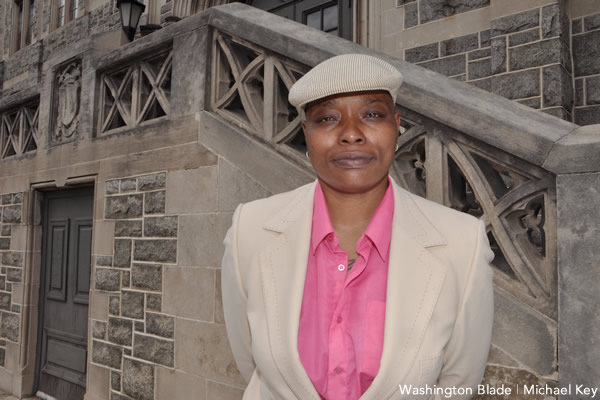
Venus Thrash, a Black, lesbian D.C. poet, wrote her first poem when she was in the first grade.
Thrash, 52, whose work was nationally acclaimed, died on Saturday, June 19 at the MedStar Washington Hospital Center in Washington, D.C. from heart disease. Her family and 12-year-old son Daniel survive her.
Thrash, who had a master’s degree in fiction and poetry from American University, taught in underserved high schools and women’s correctional facilities as well as in academic settings.
“I feel passionate about [teaching],” Thrash, whose poetry collection “The Fateful Apple” was nominated for the 2015 Pen America Open Book Award, told me in 2014. “Not only am I teaching in that exchange, I’m also learning.”
Though Thrash called D.C. her “adopted home,” her roots were in the Deep South. She spent her childhood summers in Rincon and Sylvania, Ga.
Thrash, who was open about her sexuality, sensed, as a child, that she was different
“I am seven/I want to be an angel/because I have never been an angel,” she wrote in her poem “Angel.”
“I must act like a lady/I have never acted like a lady/I have demanded to be called Vince.”
Thrash lived fully in her self, Black and queer, and that intersectionality infused her poetry and relationships, Sarah Browning, former director of Split This Rock, a D.C.-based poetry organization that works for social change, told the Blade.
In addition to being a finalist in the 2012 Jean Feldman Poetry Prize and the 2009 Arktoi Books Poetry Prize, Thrash was a co-editor of “Beltway Poetry Quarterly” and a co-director of The Word Work’s Joaquin Miller Poetry Series.
She was a Cave Canem fellow. (The Cave Canem Foundation, according to its website, was founded by Toi Derricotte and Cornelius Eady in 1996 “to remedy the under-representation of African-American poets in the literary landscape.”)
Thrash was featured at one of Split This Rock’s festivals. “Venus’s poetry is like Venus full of joy and outrage, and love,” Browning said. “Every time I saw her I was delighted by her flirty, irreverent spirit.”
On social media postings after her death, Thrash was often described as “fierce” because of her appearance – her shaved head, her androgynous way of dressing, Kim Roberts, founding editor of “Beltway Poetry Quarterly,” emailed the Blade. “But Venus was actually quite shy,” Roberts said.
Roberts loved the conversations that she and Thrash had about the intersection of gender and race. “I am Jewish and bisexual,” Roberts, editor of the anthology “By Broad Potomac’s Shore: Great Poems from the Early Days of Our Nation’s Capital,” said. “We both noted how different our own lived experiences were, yet we found joy from our long, freewheeling discussions.”
Grace Cavalieri, poet laureate of Maryland, knew Thrash before Thrash was a mother and well published. “I saw her enter the poetry scene – working for every D.C. institution to further poetry,” Cavalieri, founder/producer of the radio show “The Poet and the Poem,” said. “She was the best citizen in the poetry republic.”
Venus rolled with everybody, remembers poet Hayes Davis, author of “Let Our Eyes Linger.”
“If Venus called herself your friend, she would laugh with you, drink with you, talk shit with you … talk about relationships with you,” Davis said. “We could talk about parenting, we could talk about ourselves.”
In “The Fateful Apple,” you see a poet who is entirely at home with her body, her loves, her desires, her history – her friends, D.C.-area poet Joseph Ross emailed the Blade.
“I especially remember her generous kindness to my husband, who is not a poet,” Ross, author of “Raising King,” said. “At poetry gatherings, she often found us and made him and me feel at home.”
One of Thrash’s most powerful poems is “Uncivil,” a pointed, yet joyous rebuke to any government that dictates who we can love.
“There will be no parchment certificate stamped with any state’s approval/confirming we’re married or in love,” Thrash writes in “Uncivil,” “But we will jump over a brand new straw/broom, we will light candles & pour red/wine into the earth where our ancestors sleep.”
Thank you, Venus, for your poetry and your wonderful self. R.I.P.







